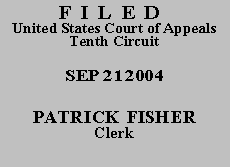

| LINDAWATI TJANDRA; WE LI
TJEONG,
Petitioners, v. JOHN ASHCROFT, Attorney General of the United States, Respondent. |
|
Petitioner Lindawati Tjandra and her husband, petitioner We Li Tjeong, seek review of a decision of the Board of Immigration Appeals (BIA) dismissing their appeal from the denial of their application for asylum, withholding of removal, and relief under the Convention Against Torture. The alleged persecution was aimed at Ms. Tjandra; therefore, Mr. Tjeong's claims are dependent on her claims. Because we conclude that we lack jurisdiction to hear this appeal, we dismiss the petition for review.
Petitioners are citizens of Indonesia and ethnic Chinese. They are Christian. Indonesia is a predominantly Muslim country. Ms. Tjandra claims that, on account of her race or religion, she was gang-raped by seven men during the Indonesian riots of May 1998, that one of the men was dressed in military clothing, and that she suffers severe depression as a result of this ordeal. On October 28, 1998, Ms. Tjandra and her husband fled Indonesia and entered the United States on visitors' visas. On October 14, 1999, Ms. Tjandra and her counsel signed an application for asylum and withholding of removal, but the application was not filed until December 1999, more than one year after petitioners entered the United States. The INS(1) thereafter served petitioners with notices to appear, asserting that they were removable under 8 U.S.C. § 1227(a)(1)(B), for overstaying their visitors' visas. At a master calendar proceeding, petitioners conceded removability but sought asylum, withholding of removal, and relief under the Convention Against Torture. After a merits hearing, an immigration judge (IJ) issued an oral decision holding Ms. Tjandra's application for asylum time-barred under 8 U.S.C. § 1158(a)(2)(B). The IJ also denied withholding of removal and relief under the Convention Against Torture, but granted voluntary departure. Ms. Tjandra timely appealed to the BIA, which dismissed her appeal on April 21, 2003. In doing so, the BIA held that the IJ "correctly pretermitted her asylum application." Admin. R. at 9. The BIA also denied withholding of removal and relief under the Convention Against Torture. This petition for review followed.
Ms. Tjandra raises two issues on appeal. First, she generally asserts that she received ineffective assistance of counsel from the attorney who represented her before the IJ and BIA. In particular, she claims that she was prejudiced by her former attorney's deficient performance because her former attorney failed to timely file her asylum application.(2) Second, Ms. Tjandra asserts that she was incorrectly denied withholding of removal.
Before we address Ms. Tjandra's first issue, which she raises for the first time in this court, we must examine our jurisdiction. As we have often stated, "[t]he failure to raise an issue on appeal to the Board constitutes failure to exhaust administrative remedies with respect to that question and deprives the Court of Appeals of jurisdiction to hear the matter." Rivera-Zurita v. INS, 946 F.2d 118, 120 n.2 (10th Cir. 1991). Notwithstanding, "[c]ourts have carved out an exception to the exhaustion requirement for constitutional challenges to the immigration laws, because the BIA has no jurisdiction to review such claims." Akinwunmi, 194 F.3d at 1341. But because the BIA has created a mechanism for hearing an ineffective assistance of counsel claim, see Matter of Lozada, 19 I. & N. Dec. 637 (BIA 1988), this court has held that an "alien's failure to raise the claim to the BIA," via a motion to reopen the administrative proceedings, "deprives this court of jurisdiction to review it." Akinwunmi, 194 F.3d at 1341; see also Osei v. INS, 305 F.3d 1205, 1208 (10th Cir. 2002) (noting that because the Board has "a mechanism for hearing due-process based claims of ineffective assistance of counsel, such claims must first be presented to the Board"). Likewise, this court is without jurisdiction to hear any argument with respect to the denial of petitioners' request for withholding of removal or relief under the Convention Against Torture because petitioners did not raise these issues before the BIA. See Rivera-Zurita, 946 F.2d at 120 n.2.
Accordingly, we DISMISS the petition for review because we lack jurisdiction.
Entered for the Court
Senior District Judge
*. This order and judgment is not binding precedent, except under the doctrines of law of the case, res judicata, and collateral estoppel. The court generally disfavors the citation of orders and judgments; nevertheless, an order and judgment may be cited under the terms and conditions of 10th Cir. R. 36.3.
2. The Honorable John L. Kane, Senior District Judge, United States District Court for the District of Colorado, sitting by designation.
1. "The INS ceased to exist on March 1, 2003, and its functions were transferred to the U.S. Citizenship and Immigration Services ("USCIS") within the newly formed Department of Homeland Security." Sviridov v. Ashcroft, 358 F.3d 722, 724 n.1 (10th Cir. 2004).
2. Contrary to petitioners' suggestion that the Sixth Amendment entitles those in deportation proceedings to the effective assistance of counsel, "there is no Sixth Amendment right to counsel in a deportation proceeding." Akinwunmi v. INS, 194 F.3d 1340, 1341 n.2 (10th Cir. 1999). Instead "a claim of ineffective assistance of counsel in a deportation proceeding may be based only on the Fifth Amendment guarantee of due process." Id. Because petitioners' brief on appeal contains Fifth Amendment ineffective-assistance-of-counsel arguments, albeit without citing the Fifth Amendment, we assume, without deciding, that petitioners also proceed under a Fifth Amendment due process theory.